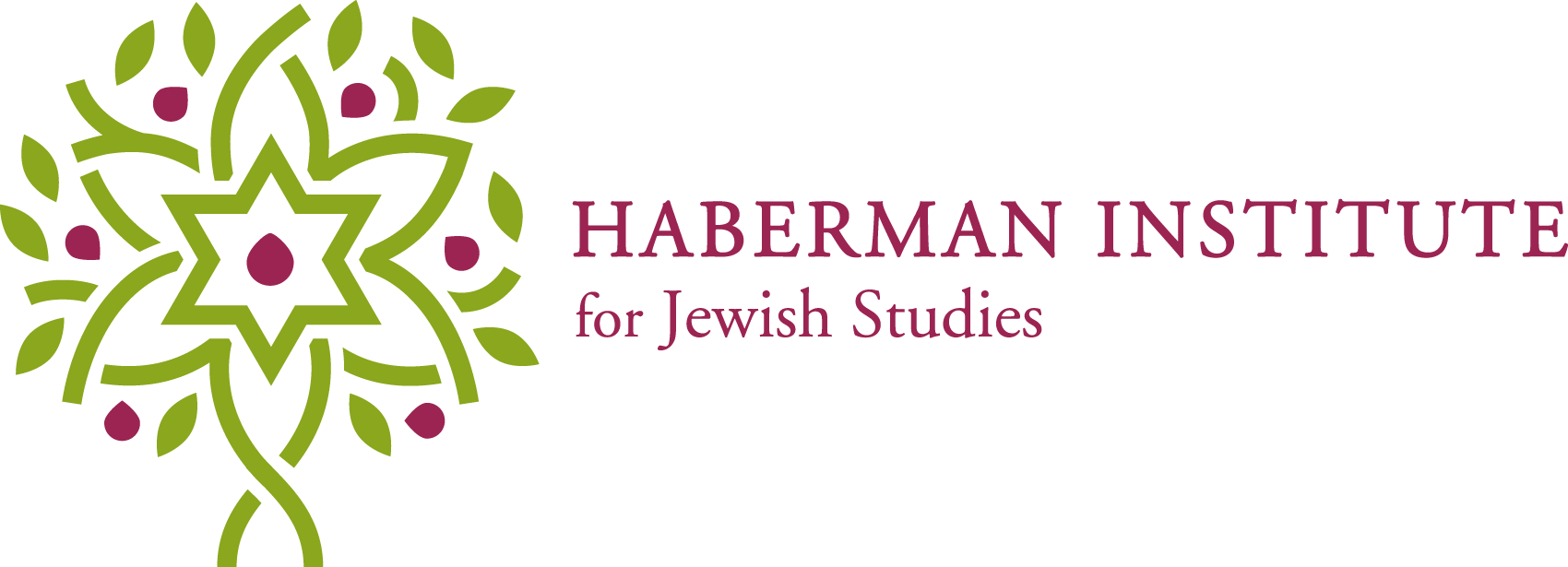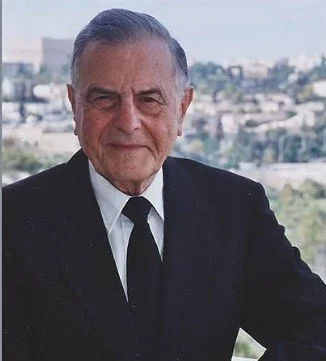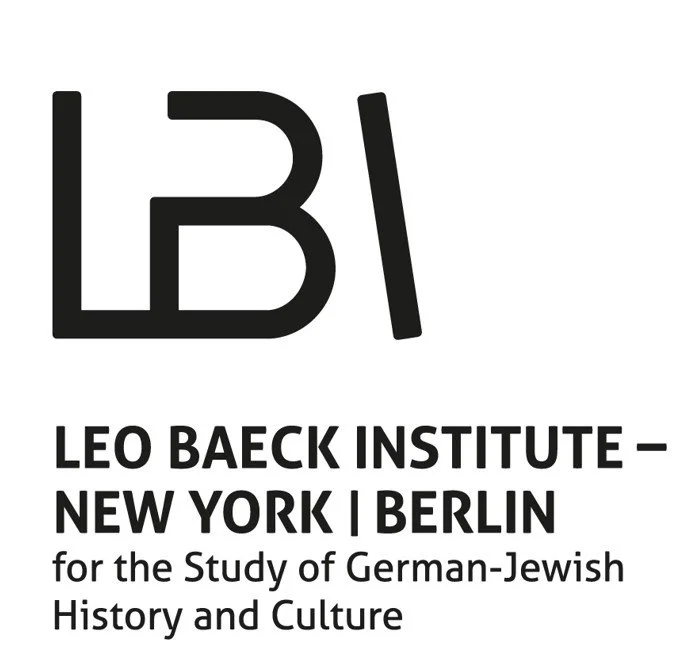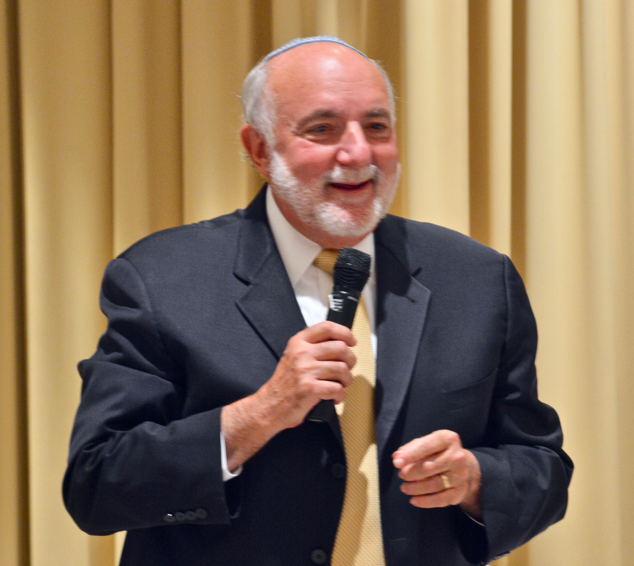40th Anniversary Day of Learning
Dedicated in memory of Rabbi JOshua O. Haberman, z”L
Presented by Rabbi David Ellenson, Ph.D
Chancellor Emeritus, Hebrew Union College
Join us to kick off our anniversary year at this very special Day of Learning! We are honored to welcome Rabbi David Ellenson, Ph.D. to the Haberman Institute community. A world-renowned scholar and Jewish communal leader, Rabbi Ellenson is currently Chancellor Emeritus at Hebrew Union College after serving as the President of the college for many years as well as directing the Schusterman Center for Israel Studies at Brandeis University from 2015-2018. (See lecture details below.)
A catered kosher dinner will be served between the two sessions.
Registration is no longer open for this program. You can watch the recording of the talk online here.
Session #1
Rabbi Leo Baeck and Carl Jung: A Tale of Reconciliation, and Perhaps Forgiveness –
A Lesson for the High Holidays
In 1947, the famed psychiatrist Carl Jung met with Rabbi Leo Baeck, the last head of the German Jewish community prior to its destruction by the Nazis. Jung had been sympathetic to the Nazi regime during the 1930s and was seeking forgiveness from and a renewed relationship with Rabbi Baeck. We will delve into this rich narrative to ask complex questions and consider how the exchange and the meeting between them might inform our own approach to forgiveness and reconciliation. Is it sufficient if the person who did the injuring simply asks for forgiveness? What if the one who caused the harm shows no repentance? If the injuring party shows genuine remorse, should the injured party forgive, or at least reconcile? How might forgiveness benefit each party? Is there a distinction between forgiveness and reconciliation? Such questions are especially important as we reflect on the meanings Rosh Hashanah and Yom Kippur hold for us as we consider our own deeds and the deeds of others -- especially those who have injured us.
Session #2
Truth-Telling and Jewish Tradition: The Case of Rabbi Leo Baeck and the Holocaust
We return to Rabbi Leo Baeck and the moral dilemmas he confronted as leader of the Jewish community in Germany during the time of Nazi oppression, destruction, and cruelty. As head of the community, he faced the moral dilemma of being completely transparent about what the Nazis were doing while shielding his community from the “full truth” in the hope that more Jewish lives would thereby be saved. We will consider two of the cases that faced Rabbi Baeck and view positive as well as critical responses others held regarding his actions in these situations. We will also examine Rabbi Baeck's own words about his deeds in these instances. Finally, we will explore what classical Jewish sources say about truth-telling and look at Rabbi Baeck’s deeds from the perspective of what the famed Holocaust historian Saul Friedlander describes as “limit situations,” situations in extremis where moral judgments must be made. In so doing, we will ask whether there is a moral obligation to always be completely candid? Is there something unique about the Holocaust, or can this type of "limit situation" teach us about "truth-telling" in our own lives? How do you view the "shades of grey" these situations evoke?
This event is dedicated to the memory of Rabbi Joshua Haberman, z"l… Our beloved founder who saw the need for a new organization that would offer adult Jewish learning to all who are interested. We embrace his vision by providing high-quality, in-depth encounters with Jewish thought, history, and culture. The majority of our programs remain free and open to the public, made possible by our donors.
Thank you to our Anniversary Sponsors for helping to bring this Day of Learning and countless other programs to the Haberman Institute community!
Sponsor list, as of August 23, 2023
Andrew R. Ammerman
Elaine Amir
Rabbi Stephanie Bernstein
Dr. Wendy Rubinstein and Carl Cohen
Rabbi George and Sue Driesen
Rachel and Eddie Eitches
Ellen and David Epstein
Esther and Bert Foer
Jay Freedman
Bobbie and Mike Goldman
The Haberman Family
In celebration of Samuel and Anita Hack z"l by their children Diane Hack Gould, Jeryl Oristaglio, and Marcia Parness and their families
Naomi Weiss and Bill Halpern
Connie Forchheimer Heller
Edie and Arthur Hessel
Patti and Harvey Iglarsh
Ruth and Adina Lambert, on behalf of their mother, Rochelle Lambert, dear sister of Rabbi Joshua Haberman
Marjorie and Larry Kravitz
Jiska and Allen Mansfield
Zena and Paul Mason
Sandy and Adina Mendelson
Marsha Stiefel Pinson
Louise Piver
Barbara and Michael Smilow
Marsha and Kevin Teichman
Diane Abelman Wattenberg
Susan and Lew Winarsky
Thank you to Hebrew Union College and Washington Hebrew Congregation for their support of the Haberman Institute and this Day of Learning, and to our Community Sponsors, listed below.
Rabbi Amy R. Perlin
Rabbi Marc Israel, Tikvat Israel Congregation
Rabbi Michael Mellen, Iron and Sage
Rabbi Jonathan Roos, Temple Sinai
Rabbi David Widzer, Temple B'nai Shalom
Rabbi David Ellenson is Chancellor Emeritus and served as President of Hebrew Union College-Jewish Institute of Religion from 2001-2013 and again from 2018-2019 where he is also Grancell Professor Emeritus of Jewish Thought. He served as well as Director of the Schusterman Center for Israel Studies at Brandeis University from 2015-2018 and is currently Professor Emeritus of Near Eastern and Judaic Studies at Brandeis.
Ellenson has written extensively on the origins and development of Orthodox Judaism in Germany during the Nineteenth Century, Orthodox legal writings on conversion in Israel, North America, and Europe during the modern era, the relationship between religion and state in Israel, the history of modern Jewish religious movements, and American Jewish life. Ellenson received his Ph.D. from Columbia University in 1981 and was ordained as a rabbi by HUC-JIR in 1977. Previously, he received his A.B. degree from the College of William and Mary in 1969 and the University of Virginia granted him an M.A. in Religious Studies in 1972.
Ellenson taught at the University of Southern California for more than two decades and served as a Visiting Professor at both UCLA and the Jewish Theological Seminary of America. He has been a Fellow of the Shalom Hartman Institute of Jerusalem as well as a Fellow and Lecturer at the Institute for Advanced Studies and a Lady Davis Visiting Professor of the Humanities in the Department of Jewish Thought at the Hebrew University in Jerusalem. In the Spring of 2015, New York University appointed him as Distinguished Visiting Professor. Colgate University, The College of William and Mary, Hebrew College of Boston, and The Jewish Theological Seminary have all conferred honorary doctoral degrees upon him.
Ellenson has authored or edited eight books and over 300 articles and reviews in a wide variety of academic and popular journals and newspapers. His book, After Emancipation: Jewish Religious Responses to Modernity, won the National Jewish Book Council’s award as outstanding book in Jewish Thought in 2005. His work, Rabbi Esriel Hildesheimer and the Creation of a Modern Jewish Orthodoxy, published by the University of Alabama Press in 1990, as well as his book, Pledges of Jewish Allegiance: Conversion, Law, and Policymaking in Nineteenth- and Twentieth-Century Orthodox Responsa, co-authored with Daniel Gordis and published by Stanford University Press in 2012, were both nominated for book awards by the National Jewish Book Council. His book, Jewish Meaning in a World of Choice, appeared in September of 2014 in the University of Nebraska/Jewish Publication Society’s Scholar of Distinction Series. His academic colleagues honored him with a Festschrift, Between Jewish Tradition and Modernity: Rethinking an Old Opposition – Essays in Honor of David Ellenson, edited by Michael A. Meyer of HUC-JIR and David N. Myers of UCLA, in 2014. His latest book, American Jewish Thought Since 1934: Writings on Identity, Engagement, and Belief, was co-edited with Michael Marmur and published by Brandeis University Press in the Brandeis Library of Modern Jewish Thought Series in Spring, 2020.






